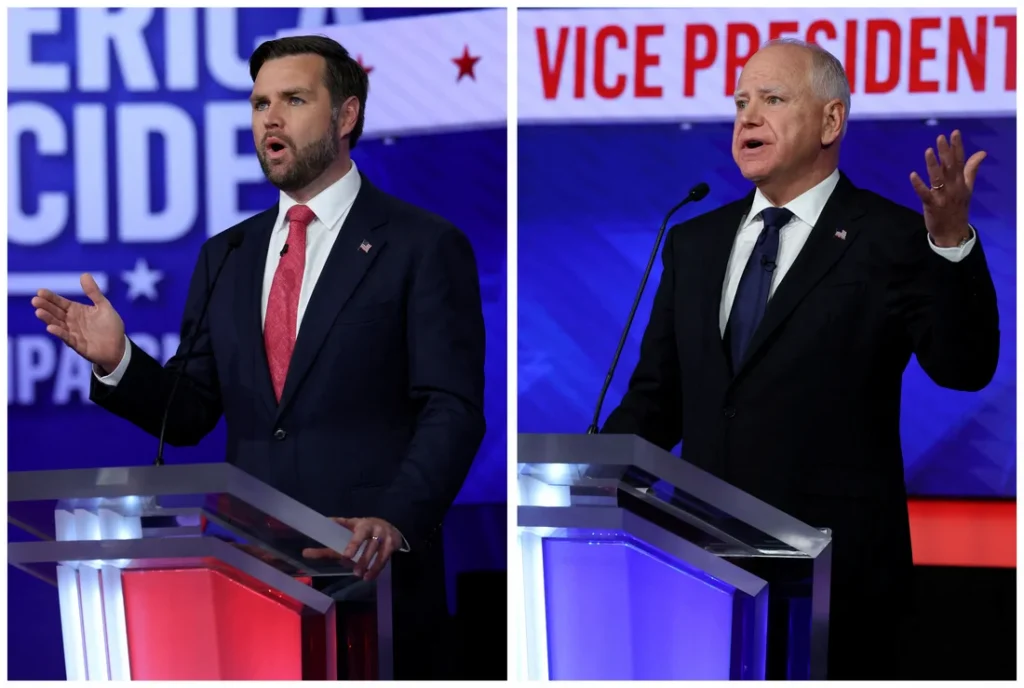Democrat Tim Walz and Republican JD Vance faced off in a surprisingly civil vice presidential debate late Tuesday, amid a contentious election marked by harsh rhetoric and two assassination attempts.
Despite their aggressive campaigns against each other, the candidates maintained a cordial demeanor, directing their criticisms mainly towards the individuals at the top of their tickets—Democratic Vice President Kamala Harris and former Republican President Donald Trump.
The most heated moment came toward the debate’s conclusion when Vance, who has expressed opposition to certifying the 2020 election results, dodged a question about whether he would contest this year’s election if Trump were to lose.
Walz countered by holding Trump accountable for his false claims of voter fraud, which he said incited the January 6, 2021, attack on the U.S. Capitol in an effort to block the certification of Joe Biden’s victory.
“He continues to insist he didn’t lose the election,” Walz remarked, turning to Vance. “Did he lose the 2020 election?”
Once again, Vance avoided a direct answer, instead accusing Harris of attempting to censor opposing viewpoints online.
“That’s a damning non-answer,” Walz retorted.
Walz, 60, the progressive governor of Minnesota and a former high school teacher, and Vance, 40, a bestselling author and conservative U.S. senator from Ohio, have positioned themselves as representatives of America’s Midwestern heartland, though their views on key issues starkly contrast.
As the last debate before the November 5 presidential election, both candidates aimed to make an impact as they discussed topics like the Middle East crisis, immigration, taxes, abortion, climate change, and the economy.
However, both men largely adhered to a tone of “Midwestern nice,” expressing gratitude toward one another even while attacking their running mates in a typical vice presidential debate format.
Vance criticized Harris for not taking more action on inflation, immigration, and economic issues during her tenure in Biden’s administration, echoing a line that Trump had struggled to deliver during his debate with Harris last month.
“If Kamala Harris has effective solutions for middle-class issues, she should implement them now—rather than wait for a promotion, she should act in the role the American people entrusted her with 3.5 years ago,” Vance said.
Walz, on the other hand, painted Trump as an erratic leader who favors the wealthy, flipping Vance’s immigration criticism back at him by attacking Trump for urging congressional Republicans to abandon a bipartisan border security bill earlier this year.
“Most of us want to find a solution,” Walz stated regarding immigration. “Donald Trump had four years to tackle this and promised Americans it would be simple.”
The debate’s atmosphere sharply contrasted with the overall divisiveness of the campaign. Trump has repeatedly disparaged Harris, often with racist and sexist remarks, and has survived two assassination attempts. Walz has previously described his Republican opponents as “weird,” while Vance faced backlash for derogatory comments regarding some Democrats.
The debate, held at the CBS Broadcast Center in New York, kicked off with discussions on the escalating Middle East crisis, with Israel continuing its operations in southern Lebanon and Iran launching retaliatory missile strikes.
Walz described Trump as too “fickle” and sympathetic to authoritarian leaders to be trusted with the growing conflict, while Vance claimed that Trump made the world safer during his presidency.
When asked about supporting a preemptive strike against Iran by Israel, Vance indicated he would defer to Israel’s judgment, while Walz refrained from answering directly.
As the debate unfolded, Trump was actively posting on his Truth Social platform, attacking the CBS moderators and labeling Walz as “pathetic” and “low IQ.”
A RAZOR’S EDGE
Political analysts generally agree that vice presidential debates do not significantly influence election outcomes. However, even a small shift in public perception could be critical, given the tightly contested race just five weeks before Election Day.
Walz addressed recent reports questioning his claim about being in China during the violent 1989 Tiananmen Square protests.
“I misspoke at times,” he acknowledged during a lengthy response. “I was in Hong Kong and China during the democracy protests, and it taught me a lot about governance.”
Meanwhile, Vance defended his running mate despite previously criticizing Trump before the 2016 election.
“I was mistaken about Donald Trump,” he admitted. “I believed some misleading media narratives about his record. Most importantly, Donald Trump delivered for the American people.”
Walz also criticized Trump for appointing three Supreme Court justices who contributed to the elimination of nearly a half-century nationwide abortion rights, an issue that has proven to be detrimental to Republicans.
Vance, known for his conservative stance on abortion, took a more moderate position during the debate, stating that he did not support a national ban despite having previously backed Republican Senator Lindsey Graham’s proposed 15-week limit in 2022. He indicated that Trump believes individual states should decide abortion regulations.
In a social media post, Trump stated he would veto a national ban, contrasting with his previous reluctance to answer the question during his debate.
Despite Vance’s success with his memoir “Hillbilly Elegy,” recent polling by Reuters/Ipsos revealed that 51% of registered voters view him unfavorably, while only 39% have a favorable impression. In comparison, Walz was viewed favorably by 44% of registered voters, with 43% holding an unfavorable opinion in a poll conducted from September 20 to 23.
Harris was widely regarded as the victor in her only debate with Trump on September 10 in Philadelphia, which was markedly more chaotic than Tuesday’s encounter.
While Harris has slightly gained in national polls, most surveys indicate that voter sentiment remains fairly split in the seven states that will determine the outcome of the November election.

